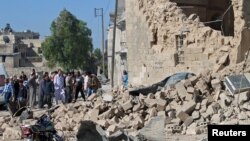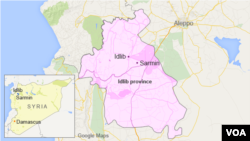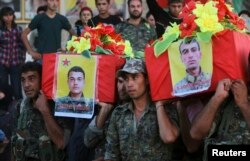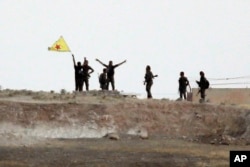A few weeks ago, Syrian rebel leaders like Abdul Rahman were optimistic. With insurgents seeking to topple President Bashar al-Assad storming the northwestern city of Idlib, commanders talked as if the final phase of the four-year civil war had begun.
Militia leaders spoke of taking the war out of northern Syrian provinces and putting pressure on Latakia on the coast or striking south toward Hama and Homs. That would afford them the opportunity to threaten the Syrian capital of Damascus and coordinate more with rebel militias in its southern and eastern suburbs.
But after Islamic State extremists launched a surprise offensive – this time on Syrian rebel strongholds north of Aleppo – that confidence is gone.
"We thought we would be targeting Homs or driving to the sea and Latakia and now look what happened," Rahman said.
Reinforcements dispatched from Idlib prevented the capture of a crucial border crossing with Turkey. Fierce battles with Islamic State fighters continue in the rebels’ stronghold villages to Aleppo's north and northeast.
"There [are] some really terrible clashes going on," Rahman said.
A red-haired former businessman who sports a trimmed beard, Rahman is aligned with Jaish al Fata, or the Army of Conquest, an Islamist-dominated rebel alliance that formed in March.
He has been fighting since the start of the Syrian conflict, when anti-Assad reform demonstrations gave way to a full-blown civil war – first in his hometown of al-Bab, then in Aleppo, Syria’s commercial hub, and later in Idlib.
Rahman spoke with VOA in southern Turkey over Iftar, the sunset meal with which Muslims end their daily Ramadan fast.
"The meal would be better in Syria," he said with a sigh. "When the war is over, you will have Iftar in Syria in my home.” The evening call to prayer rang out and a strong wind battered the windows.
Wins and losses
In the last few months, the conflict raging in Syria has taken a series of dizzying turns.
The war has many sides – forces loyal to Assad, insurgents of different stripes, jihadists and Kurds – and none knows what the next day will bring.
Each side can boast of victories, although Syrian government forces have been on the defensive for months.
But as rebels, Islamic extremists and Kurds make advances, each suffers losses elsewhere or experiences distractions that, left unmet, risk turning into more serious threats.
That was on sharp display Thursday, when Islamic State fighters mounted a surprise attack led by car bombings on Kobani, the mainly Kurdish border town they besieged for months, only to turn tail in January in the face of tough Kurdish resistance and U.S.-led coalition airstrikes.
The Kobani attack, like another launched Thursday in neighborhoods in the south of the city of al-Hasakah in eastern Syria, involved trademark Islamic State tactics. The group moves its forces rapidly to seek strategic gains and to take pressure off its fighters when they are on the ropes elsewhere.
In this case, the "elsewhere" is Raqqa, the capital of the Islamic extremists’ self-declared caliphate. Kurdish-led forces are just 48 kilometers north of Raqqa now.
Not enough troops
The dizzying turns in battlefield fortunes, said Rahman and other rebel commanders, can partly be explained by manpower shortages suffered on all sides.
"No one has enough forces to ensure their hold on territory," Rahman said. He acknowledged this applies as well to rebel militias: both Islamist and those aligned with the Western-backed Free Syrian Army (FSA).
For the last 20 days, Rahman has been on a recruitment drive among Syrian refugees in southern Turkey.
"There are more than 100,000 young Syrian men here in Gaziantep and they just don’t want to enlist," he said.
He managed to recruit just 80.
Thirty are now in Syria undertaking a 20-day military training course – insufficient time, rebel commanders acknowledge, but longer training is a luxury they can ill afford.
The men he's drummed up are not enough to replace those who've been lost, Rahman said. "When we lose a fighter, there isn’t a new one to replace him."
The jihadist Islamic State is also overstretched and "suffering manpower shortages," said anti-Islamic State activist Ahmad Abdulkader.
With the Kurdish-led capture of the border town of Tal Abayad earlier this month, the Islamic State group is having difficulty funneling in large numbers of foreign volunteers.
Rebel commanders said the stretch of the border with Turkey they still control around Jarabulus is well patrolled by Turkish security forces.
Limited resources
For all the media reports of this or that country backing this or that brigade, the rebels have few financial resources, and most of their weaponry is what they've captured from Assad's forces.
Back in 2012 and 2013, foreign-supplied weaponry was more prevalent, funded by Gulf countries.
The United States supplied anti-tank missiles to favored FSA militias in northern Syria last year.
But after many of the militias collapsed through infighting or aligned too closely with hard-core Islamist brigades, arms supplies from the U.S. have fallen off, a senior State Department official told VOA, speaking on the condition of anonymity.
This month, U.S. Defense Secretary Ash Carter told a House committee that the American "train and equip" program for Syrian rebels is "much trickier" than a similar effort underway with the Iraqi, in part because of concerns over controlling equipment issued to Syrian trainees.







